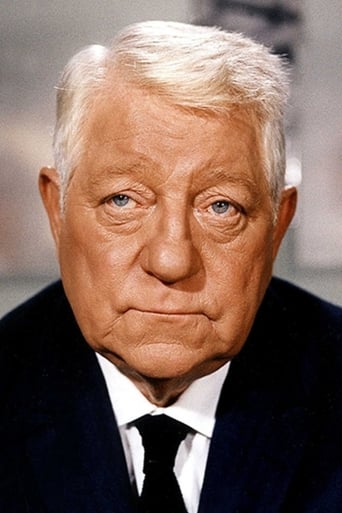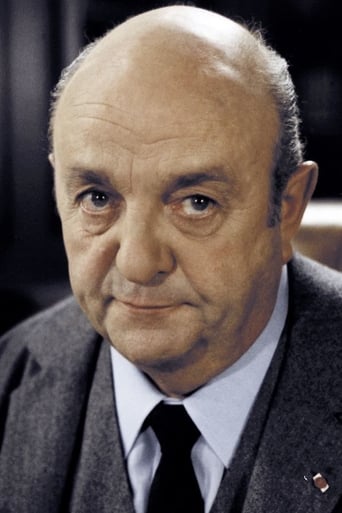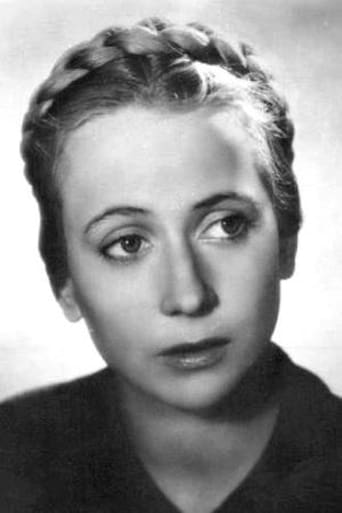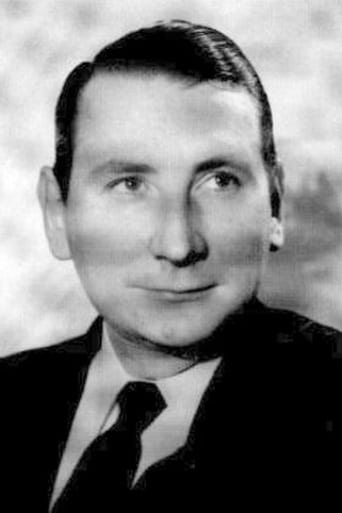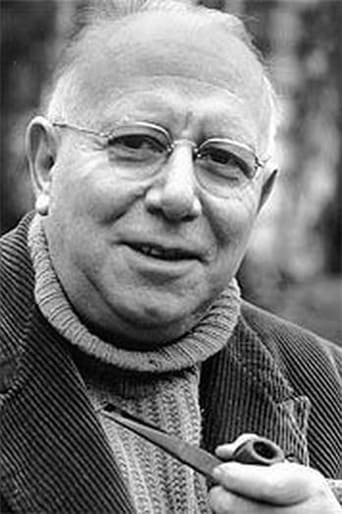Alicia
I love this movie so much
SoftInloveRox
Horrible, fascist and poorly acted
AutCuddly
Great movie! If you want to be entertained and have a few good laughs, see this movie. The music is also very good,
Lucia Ayala
It's simply great fun, a winsome film and an occasionally over-the-top luxury fantasy that never flags.
Emil Bakkum
Le President is, first of all, a political film. Politics is really my thing, of course together with economics, since any work will have to be paid. Having written this, we live in an imperfect world. That is, probing my familiarity with the French intricacies yields one word: poor. Still it is sufficient (assez!) to review at least the contents of the film. I guess that I must begin with a brief sketch of the story, so that we know what we are talking about. You may call this a spoiler, but honestly who likes surprises? I bet that when you take a book in hand you alway secretly peep at the final pages. So: the main theme is political integrity - as far as I can see, while knowing that it is nothing but an illusion. Emil Beaufort was once the president of France, and consequently the chairman of the Conseil (council) of ministers. When we first meet him, he is already retired and writing his memoirs. Consequently the film uses one long flashback to narrate the events during his active political career, a kind of re-switching. The then government and Beaufort decide in secret to devalue the franc, the currency of the time. Imprudently or cunningly (who knows?) his personal assistant Philippe Chalamont leaks the information to his wife. And not surprisingly she leaks to her father, a stinkingly rich business man, who takes advantage of the information. From then on Beaufort is convinced that Chalamont is a ne'er-do-well. This opinion reflects his own character, which in spite of his king-like position is supposed to have remained essentially modest. Typical is his vow: "La France has been my only mistress". Reflect on that. Of course Jean Gabins coarse features underline this message. Nevertheless the ne'er-do-well turns out to be extremely talented, and his star rises quickly on the firmament of French politics. Finally Chalamont is nominated as the new French president. In order to get the necessary backing, he visits the castle, where Beaufort spends his final simple years. At first Beaufort is sympathetic. But when Chalamont, trying to be nice, promises to consult him with regard to important future decisions, Beaufort is completely turned off. He blocks the nomination by threatening to disclose the past lapse of Chalamont. End of story. Is this brilliant? You tell me. However beware, because since my knowledge of French is in its infancy, I grasp only about 20% of the tale. Undoubtedly the versatility of the film partly surpasses my view. I can yet follow the interesting speech of Beaufort in favour of a European federation - a French ideal, which never really materialized. But then there is the process of aging, the abdication of power, the political integrity, his attitude towards women ("She shows respect by lying about her absence. It would have been disrespectful to admit that she was simply being laid"). I don't know. And why is Beaufort also a gifted oboist? Apart from this, the film was obviously amazing and recommendable. If you fancy political stories, consider seeing my other reviews.
Kahuna-6
Here is a film made in 1961. Yet, it could have been made yesterday.The issues surrounding the European Union, very clearly illustrated in this movie, are still reverberating around the world today. Idealism vs realpolitik. Vested interested vs the 99%. Can politicians be both moral & pragmatic? Can there be compromise without sacrificing principles? Can power be exercise decently? The screenplay written by Michel Audiard is outstanding. Complex issues are presented effectively and clearly. It is no wonder that he is much proclaimed amongst the French literati.This film has no fancy effects or fast cuts. There is no easy Hollywood style resolution. But watch if you want a little illumination in a muddy world.
jotix100
Emile Beaufort, a former French president, is now living in his country home, surrounded by his memories about his life in politics. As the story begins, the English P.M., Sir Merryl, arrives to pay a visit to his former ally. The visit, although brief, tells us how much appreciated Beaufort was during his public life. Now in retirement and in fading health, Beaufort has been working in his memoirs, assisted by his faithful secretary, Ms. Milleran.The former president confesses he was married for only ten years, but he had a forty year affair with his mistress: France. It is clear the love Emile has for the country in which he was able to work toward its greatness. One of the worst moments in his life is connected to the ambitious Philippe Chalamont, a man that almost derailed France's recovery after WWII by revealing a state secret to his wife. Emile Beaufort never forgave him, asking him to write a letter just in case he would try to capitalize on his connections to become president of France. In the end, Emile Beaufort thought better of fulfilling his promise, not before having a confrontation with Chalamont.The film is based on a George Simenon novel, of the same title. Not knowing what the film was about we were looking for the wrong reason when the film started. It has nothing to do to anything prior associated to the author, a master writer of mystery and crime. As directed by Henry Verneuil, the movie is a political drama that is involving, even though French politics of those years are not exactly a subject often seen in pictures. The crisp dialogue was adapted by Michel Audiard, the father of Jacques and Francois Audiard, in collaboration with the director. To Mr. Audiard's credit the sequence where Emile Beaufort faces a hostile parliament is one of the best things in movies about this subject.The best asset in the film is Jean Gabin. He was a man that brought an integrity and credibility to everything he asked to play. Such is the case with his Emile Beaufort, a man that truly loved his country. Mr. Gabin gave one of his many excellent portrayals for the French cinema in this film. Equally good, Bernard Blier, another excellent actor who matches Mr. Gabin well. Renee Faure is seen as his secretary Milleran. Alfred Adam, Louis Seigner, are seen among the supporting players.
Lilie Vitra
I start watching the movie half way through, well at the passage where he speaks in front of the the Assembly and the speech written was very powerful. it reminded a lot about " Mr Smith goes to Washington" and how much Politician should be. full of ideals, beliefs and passion for humanity.There are a few lines at the end that are quite good too. It is at the point when B Blier visits J Gabin at his place, a few years after his demission. He has some doubts about his capacity to run the government and is asking for J Gabin's opinion. He is even asking for his discreet help when he will run the government and you think Gabin is going to accept, feeling flattered ( he does feel flattered ) and jump on the occasion to say yes but he doesn't. And he has this great other speech about how should be the man who leads a nation, pretty good lines too.
